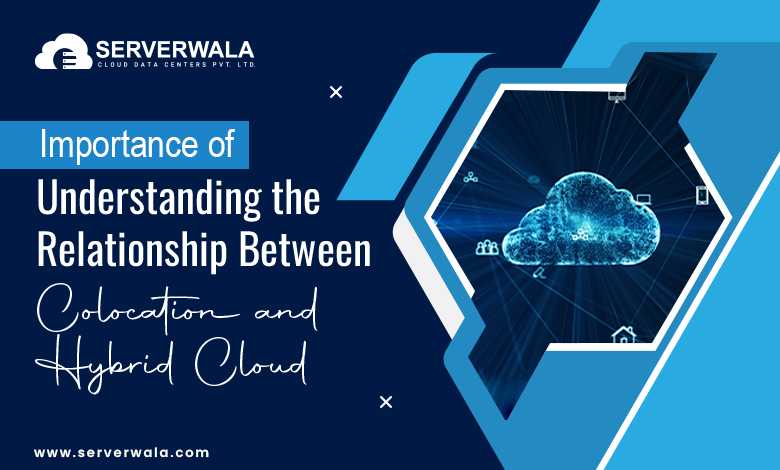Why Colocation is critical to the future of Hybrid Cloud?

Introduction
As organizations seek to optimize their IT infrastructure, hybrid cloud has emerged as a strategic solution that blends on-premises data centers with public and private cloud services. This combination permits businesses to leverage the scalability as well as flexibility of the cloud, while sustaining the control, security, and compliance that on-premises infrastructure provides. A critical enabler of hybrid cloud architectures is colocation, which offers businesses a secure and reliable physical space for hosting their IT equipment in third-party data centers. Understanding the connection between colocation and hybrid cloud is essential for maximizing the benefits of both, and this blog will explore how colocation enhances hybrid cloud performance, scalability, and security.
In this post, we’ll examine how colocation serves as the pivot of hybrid cloud platforms. We’ll highlight the essential role it plays in improving performance, reducing latency, and ensuring seamless integration between private data centers and cloud services. We’ll also discuss the cost-efficiency and flexibility that colocation brings to hybrid cloud strategies, helping businesses scale their infrastructure without significant capital investment. By the end, you’ll have a clearer understanding of how colocation supports hybrid cloud deployments and why it will continue to be crucial to their success.
A brief explanation of Hybrid Cloud

Hybrid cloud implies to an IT architecture that integrates on-premises data centers, private clouds, & public clouds into a single, integrated environment. This approach allows organizations to leverage the unique benefits of each deployment model, creating a flexible and scalable infrastructure that meets the specific needs of the business.
With hybrid cloud, businesses can dynamically move workloads between public and private cloud environments, as well as on-premises systems, based on performance, compliance, and cost requirements. For example:
- Performance: Critical or resource-heavy applications can be run on high-performance on-premises servers, while less-demanding workloads can be offloaded to the cloud.
- Compliance: Sensitive data can be held in private clouds or on-premises infrastructure to meet regulatory requirements, while non-sensitive data could be kept and processed in public cloud environments.
- Cost-efficiency: Hybrid cloud allows businesses to scale cloud resources up or down based on demand, avoiding the costs of over-provisioning on-premises infrastructure.
Importance of Understanding the Relationship between Colocation and Hybrid Cloud

The relationship between colocation and hybrid cloud is critical to the success of hybrid IT strategies. Colocation provides businesses with a secure and highly reliable environment for hosting their critical IT infrastructure while allowing seamless integration with both private and public cloud platforms. This synergy offers several important benefits:
- Performance: Colocation data centers are often strategically located in areas with excellent connectivity, reducing latency and improving the performance of cloud interactions.
- Scalability: Businesses can scale their on-premises infrastructure alongside their cloud resources, ensuring flexibility to meet growing demand without significant capital investment.
- Security: Colocated data centers provide powerful physical security, disaster recovery features, and compliance certifications, ensuring that critical systems remain safe and meet regulatory standards.
The Role of Colocation in Hybrid Cloud

Colocation plays a critical role in enabling hybrid cloud architectures by providing businesses with a physical infrastructure that seamlessly connects to cloud environments. In a hybrid setup, colocation data centers serve as the bridge between on-premises IT systems and cloud platforms, creating a unified infrastructure that optimizes performance, security, and flexibility.
Here’s how colocation enhances hybrid cloud environments:
- Low-Latency Connectivity: Colocation data centers are designed to offer fast, low-latency access to cloud providers, ensuring that data flows efficiently between on-premises systems and cloud services. Whether businesses are leveraging private cloud infrastructure or connecting to public clouds like AWS, Azure, or Google Cloud, the proximity of colocation facilities to major cloud platforms minimizes latency and accelerates workload performance.
- Optimized Workload Distribution: Colocation enables businesses to strategically distribute workloads between their on-premises systems and the cloud. For example, mission-critical applications or legacy systems can remain on-premises within the secure environment of a colocation facility, while less-sensitive, resource-demanding tasks can be offloaded to the cloud. This guarantees that resources are employed most efficiently and feasibly.
- Scalability and Flexibility: The most fundamental benefit of colocation in hybrid cloud is its flexibility. Businesses can scale their infrastructure as per the demand without having to commit to expensive cloud infrastructure for every need. Colocation offers a pay-as-you-grow model, where businesses can increase their physical resources (such as servers and storage) in the colocation center without being locked into long-term contracts. This flexibility allows companies to align their IT resources more closely with their evolving needs.
- Reduced Infrastructure Overhead: By leveraging colocation, businesses avoid the complexity and cost of building and maintaining their own data centers. Colocation providers handle the maintenance of critical infrastructure such as power, cooling, and physical security, allowing organizations to focus on optimizing their hybrid cloud strategy.
- Enhanced Security and Compliance: Security is a major consideration in hybrid cloud environments. Colocation facilities offer resilient physical security, incorporating 24/7/365 surveillance, accessibility administration, and fire suppression systems. In addition, many colocation providers meet industry-specific compliance requirements (such as HIPAA, SOC 2, or PCI-DSS), ensuring that businesses can safely store sensitive data while leveraging cloud services. This makes colocation a secure option for businesses that must stick to strict regulations.
- Improved Disaster Recovery: Colocation supports business continuity and disaster recovery strategies within hybrid cloud environments. Businesses can replicate critical data and applications in secure colocation facilities, creating redundancy and backup systems that are geographically dispersed. This guarantees that in the situation of a disaster or failure, businesses can readily recover and continue operating without significant downtime.
- Better Control and Integration: Colocated servers are entirely under the control of the business, allowing for full customization of hardware, network architecture, and configurations. This level of control is essential when integrating on-premises infrastructure with public or private cloud platforms. Colocation also allows businesses to maintain ownership of their hardware and ensure that they can meet specific performance requirements that may not be possible with a purely cloud-based setup.
Benefits of Colocation for Hybrid Cloud Environments

Seamless Hybrid Cloud Integration
Colocation provides businesses with a reliable, high-performance environment where on-premises systems can be seamlessly integrated with multiple cloud platforms. This enables businesses to easily transition workloads between private data centers and the cloud, ensuring that critical applications and data are optimally distributed across environments. The ability to integrate both public and private clouds in a single infrastructure supports a more flexible, cohesive hybrid cloud setup.
Reliability and Uptime Assurance
Colocation data centers are designed for high availability, with redundant power, cooling, and network connections to assure highest uptime. This is especially important for hybrid cloud environments that depend on conssitent and uninterrupted functioning. By using colocation, businesses gain access to advanced infrastructure that supports stringent uptime requirements, offering peace of mind that their hybrid cloud architecture will remain operational even during power outages or equipment failures.
Disaster Recovery and Business Continuity
Colocation provides businesses with powerful disaster recovery choices. With geographically distributed colocation data centers, businesses can create redundant copies of critical data and systems, ensuring that they are protected against natural disasters, cyber-attacks, or hardware failures. This level of resilience is crucial in a hybrid cloud environment, where uptime and data integrity are essential for ongoing operations.
Optimized Resource Allocation
Colocation allows businesses to optimize their resource allocation by placing critical hardware closer to cloud services, reducing the need for additional infrastructure. Rather than committing to over-provisioning cloud resources, businesses can manage their on-premises infrastructure more efficiently, allocating resources only when needed. This ensures that businesses don’t pay for underutilized capacity while maintaining the flexibility to scale as demand grows.
Customizable IT Solutions
Unlike cloud-only environments, where businesses are limited to pre-defined services, colocation offers more customization options. Businesses have full control over their hardware configurations, network setup, and even physical security measures. This flexibility allows businesses to tailor their IT infrastructure to specific performance or regulatory needs, something that is not always possible in a fully cloud-based environment.
Enhanced Network Performance and Redundancy
Colocation centers offer advanced network infrastructures with multiple carriers and connectivity options, providing businesses with access to diverse high-speed internet connections. This redundancy ensures that businesses have a more reliable and high-performance connection to cloud environments, reducing the risk of network downtime and bottlenecks. Fast and redundant network connections are essential for hybrid cloud environments that rely on constant, real-time data synchronization.
Simplified IT Management and Support
Colocation providers generally render 24/7/365 technical assistance and IT management services. This helps businesses lessen the burden of maintaining complex IT infrastructure and enables them to emphasize on their basic business functioning. Managed services, including remote hands, proactive monitoring, and troubleshooting, ensure that businesses have access to expert support whenever needed, enabling them to maintain a high level of performance across their hybrid cloud architecture.
Also Read: Everything You Need To Know About Hybrid Cloud
Summary of the critical role of colocation in the future of hybrid cloud
As hybrid cloud adoption continues to grow, colocation will remain a critical enabler, helping organizations integrate their physical infrastructure with flexible cloud environments. Colocation ensures high performance by providing low-latency access to cloud services and offering secure, reliable hosting for sensitive data. It also delivers the scalability businesses need to expand their hybrid environments as demand grows. With the ability to seamlessly connect on-premises systems to cloud platforms, colocation helps businesses strike the ideal balance between control and flexibility in their IT infrastructure.
Looking ahead, colocation will play a pivotal role in the evolution of hybrid cloud strategies, providing businesses with the performance, security, and cost-efficiency needed to thrive in a digital-first world. Serverwala offers some of the most reliable and cost-effective colocation services, designed to seamlessly support hybrid cloud environments. By providing top-tier security, 24/7 support, and flexible, scalable solutions, Serverwala enables businesses to scale their IT infrastructure with confidence while optimizing their hybrid cloud operations.




